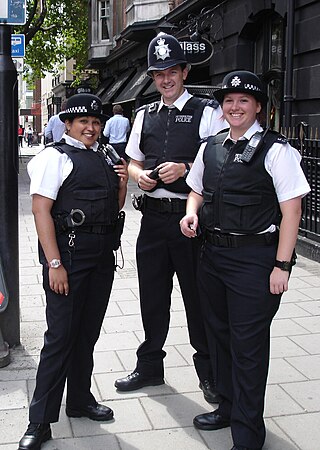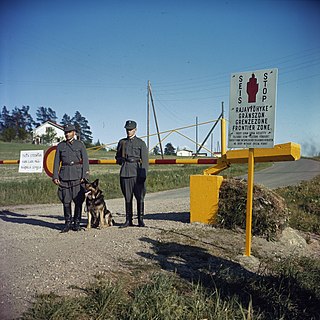Special Branch is a label customarily used to identify units responsible for matters of national security and intelligence in British, Commonwealth, Irish, and other police forces. A Special Branch unit acquires and develops intelligence, usually of a political or sensitive nature, and conducts investigations to protect the State from perceived threats of subversion, particularly terrorism and other extremist political activity.
The European Union Police Mission in Bosnia and Herzegovina (EUPM) was the European Union's mission in Bosnia and Herzegovina that aided the local police organizations, and was one of a number of European Union Police Missions worldwide. It was the first such mission undertaken by the EU within the framework of the Common Foreign and Security Policy. The EUPM was the successor to the United Nations International Police Task Force in Bosnia, whose term ended at the end of 2002.

The Home Office (HO), also known as the Home Department, is a ministerial department of the Government of the United Kingdom. It is responsible for immigration, security, and law and order. As such, it is responsible for policing in England and Wales, fire and rescue services in England, Border Force, visas and immigration, and the Security Service (MI5). It is also in charge of government policy on security-related issues such as drugs, counterterrorism, and immigration. It was formerly responsible for His Majesty's Prison Service and the National Probation Service, but these have been transferred to the Ministry of Justice.

Law enforcement in the United Kingdom is organised separately in each of the legal systems of the United Kingdom: England and Wales, Scotland, and Northern Ireland. Most law enforcement duties are carried out by those who hold the office of police constable of a territorial police force.

The Serious Organised Crime Agency (SOCA) was a non-departmental public body of the Government of the United Kingdom which existed from 1 April 2006 until 7 October 2013. SOCA was a national law enforcement agency with Home Office sponsorship, established as a body corporate under Section 1 of the Serious Organised Crime and Police Act 2005. It operated within the United Kingdom and collaborated with many foreign law enforcement and intelligence agencies.

Europol, officially the European Union Agency for Law Enforcement Cooperation, is the law enforcement agency of the European Union (EU). Established in 1998, it is based in The Hague, Netherlands, and serves as the central hub for coordinating criminal intelligence and supporting the EU's Member States in their efforts to combat various forms of serious and organized crime, as well as terrorism.
The Criminal Investigation Department (CID) is the branch of a police force to which most plainclothes detectives belong in the United Kingdom and many Commonwealth nations. A force's CID is distinct from its Special Branch. The name derives from the CID of the Metropolitan Police, formed on 8 April 1878 by C. E. Howard Vincent as a re-formation of its Detective Branch. British colonial police forces all over the world adopted the terminology developed in the UK in the 19th and early 20th centuries, and later the police forces of those countries often retained it after independence. English-language media often use "CID" as a translation to refer to comparable organisations in other countries.

Derbyshire Constabulary is the territorial police force responsible for policing the county of Derbyshire, England. The force covers an area of over 1,000 square miles (3,000 km2) with a population of just under one million.

The Criminal Assets Bureau (CAB) is a law enforcement agency in Ireland. The CAB was established with powers to focus on the illegally acquired assets of criminals involved in serious crime. The aims of the CAB are to identify the criminally acquired assets of persons and to take the appropriate action to deny such people these assets. This action is taken particularly through the application of the Proceeds of Crime Act 1996. The CAB was established as a body corporate with perpetual succession in 1996 and is founded on the multi-agency concept, drawing together law enforcement officers, tax officials, social welfare officials as well as other specialist officers including legal officers, forensic analysts and financial analysts. This multi-agency concept is regarded by some as the model for other European jurisdictions.
The Association of Chief Police Officers of England, Wales and Northern Ireland (ACPO) was a not-for-profit private limited company that for many years led the development of policing practices in England, Wales, and Northern Ireland. Established in 1948, ACPO provided a forum for chief police officers to share ideas and coordinate their strategic operational responses, and advised government in matters such as terrorist attacks and civil emergencies. ACPO coordinated national police operations, major investigations, cross-border policing, and joint law enforcement. ACPO designated Senior Investigative Officers for major investigations and appointed officers to head ACPO units specialising in various areas of policing and crime reduction.

The Independent Police Complaints Commission (IPCC) was a non-departmental public body in England and Wales responsible for overseeing the system for handling complaints made against police forces in England and Wales.

A border guard of a country is a national security agency that ensures border security. Some of the national border guard agencies also perform coast guard and rescue service duties.
The Special Detective Unit (SDU) is the main domestic security agency of the Garda Síochána, the national police force of Ireland, under the aegis of the Crime & Security Branch (CSB). It is the primary counter-terrorism and counter-espionage investigative unit within the state. The Special Detective Unit superseded the Special Branch, which itself replaced the older Criminal Investigation Department (CID), which was founded in 1921. They work in conjunction with the Defence Forces Directorate of Military Intelligence (J2) – Ireland's national intelligence service – on internal matters. The unit's headquarters are in Harcourt Street, Dublin City.

The GardaNational Bureau of Criminal Investigation (GNBCI) - formerly known as the Central Detective Unit (CDU) - is the main national criminal investigative branch of the Garda Síochána, the national police force of Ireland.

In many countries, particularly those with a federal system of government, there may be several law enforcement agencies, police or police-like organizations, each serving different levels of government and enforcing different subsets of the applicable law.
The Maritime Analysis and Operations Centre, based in Lisbon, is an initiative by 6 EU Member Countries and the UK and is co-funded by the Internal Security Fund of the European Union.

The Narcotics Control Bureau is an Indian central law enforcement and intelligence agency under the Ministry of Home Affairs, Government of India. The agency is tasked with combating drug trafficking and the use of illegal substances under the provisions of Narcotic Drugs and Psychotropic Substances Act.

The National Crime Agency (NCA) is a national law enforcement agency in the United Kingdom. It is the UK's lead agency against organised crime; human, weapon and drug trafficking; cybercrime; and economic crime that goes across regional and international borders, but it can be tasked to investigate any crime. The NCA has a strategic role as part of which it looks at serious crime in aggregate across the UK, especially analysing how organised criminals are operating and how they can be disrupted. To do this, it works closely with regional organised crime units (ROCUs), local police forces, and other government departments and agencies.

The Crime and Security Branch (CSB) – previously known as C3 – is responsible for the administration of national security, counter terrorism and serious crime investigations within the Garda Síochána, the national police force of Ireland. The section oversees intelligence relating to subversive, paramilitary and terrorism matters, conducts counter-intelligence, liaises with foreign law enforcement agencies, handles confidential informants, administers VIP and witness protection, monitors potential corrupt Garda officers and provides information on threats to the state to the Garda Commissioner and Government of Ireland.











